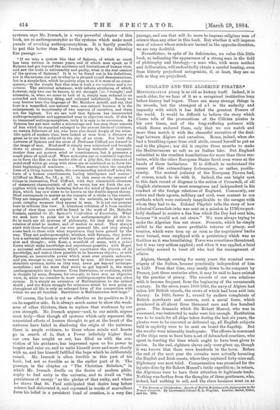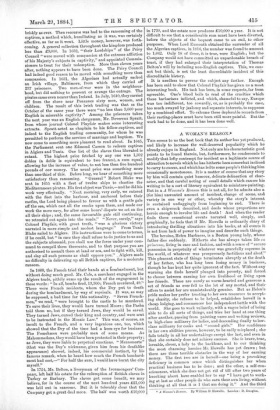ENGLAND AND THE ALGERINE PIRATES.*
MEDITERRANEAN piracy is as old as history itself. Indeed, it is much older, for we hear of it as a recognised institution long before history had begun. There are many strange things in its records, but the strangest of al is the audacity and impunity with which it has defied the greatest Powers of the world. It would be difficult to believe the story which Cicero tells of the provocations of the Cilician pirates in his own times, and of the long-suffering patience with which Rome endured them, only that we can match and more than match it with the shameful narrative of the deal- ings between Algiers and ourselves. Rome, indeed, when she had a breathing-space from civil strife, roused herself to put an end to the plague ; nor did it require three months to make the Mediterranean as safe as an Italian lake. But England submitted to the cruellest humiliations for more than three cen- turies, while the other European States fared even worse at the hands of these barbarians. It is difficult to understand the causes of this extraordinary forbearance, or rather, pusilla- nimity. The mutual jealousy of the European Powers had, of course, much to do with it. Indeed, the one bright spot in this dark record of disgrace is the action of Cromwell, of all English statesmen the most courageous and independent in his conduct of the foreign relations of England. Commonly, our rulers and their agents, military and civil, were content to use methods which were curiously inapplicable to the savages with whom they had to do. Colonel Playfair tells the story of how Admiral Cavendish (who was sent on a mission in 1738) respect- 111113; declined to receive a fine lion which the Dey had sent him, because "it would not eat straw." We were always trying to make the Algerian lion eat straw. Presents, which he simply added to the much more profitable returns of piracy, and treaties, which were torn up as soon as the negotiators' backs were turned, were employed with a persistency which was as fruitless as it was humiliating. Force was sometimes threatened, but it was very seldom applied ; and when it was applied, a fatal imbecility seemed to beset all who had the management of affairs.
Algiers, though owning for many years the nominal sove- reignty of the Sultan, became practically independent of him in 1529. From that time, very nearly down to its conquest by France, just three centuries after, it may be said to have existed by the practice of piracy. The records of our own relations with it become frequent from the beginning of the seventeenth century. In the seven years 1609-1616, the navy of Algiers had taken 466 British vessels, the crews of which had been sold into slavery. In 1620, James I., roused by endless complaints of British merchants and seamen, sent a naval force, which numbered in all about three thousand men and five hundred guns. The demands which Sir Robert Memel, who was in command, was instructed to make were fair enough. Restitution was to be made for all ships taken during the last six years, the pirates were to be executed or delivered up, all English subjects held in captivity were to be sent on board the flagship. But the results were miserably inadequate. The officers in command of the ships seem to have been a set of debauched courtiers, who spent in feasting the time which ought to have been given to action. In the end, eighteen slaves only were given up, though it was known that there were hundreds in the town. Before the end of the next year the corsairs were actually haunting the English and Irish coasts, where they captured forty-nine sail. Diplomacy was next tried. Compensation was promised for the injuries done by Sir Robert Mansers futile expedition ; in return, the Algerians were to turn their attention to legitimate trade. Nothing was further from the thoughts of these gentlemen, who, indeed, had nothing to sell, and the slave business went on as • The Scourge of Christendom: Annals of British Relations trithAlgiers prior to the French Conquest. By Lieutenant-Colonel R. L. Playfair. London; Smith, Elder, and Co. MI.
briskly as ever. Then recourse was had to the ransoming of the captives, a method which, humiliating as it was, was certainly effective, as far as it went. Little money, however, was forth- coming. A general collection throughout the kingdom produced less than 23,000. In 1632, "their Lordships" of the Privy Council "were moved with compassion at the extreme affliction of his Majesty's subjects in captivity," and appointed Commis- sioners to treat for their redemption. More than eleven years after, nothing appears to have been done. The Privy Council had indeed good reason to be moved with something more than compassion. In 1631, the Algerines had actually sacked an Irish village, Baltimore, from which they carried off 237 prisoners. Two men-of-war were in the neighbour- hood, but did nothing to prevent or avenge the outrage. The pirates came even nearer than Ireland. In July, 1610, they earned off from the shore near Penzance sixty men, women, and children. The result of this brisk trading was that in the October of the same year there were "no less than 3,000 poor English in miserable captivity." Among the prisoners taken the next year was an English clergyman, Mr. Devereux Spratt, from whose journal Colonel Playfair makes some interesting extracts. Spratt acted as chaplain to his fellow-captives, and indeed to the English trading community, for whom he was permitted to perform the services of marriage and baptism. We now come to something more pleasant to read about. In 1645, the Parliament sent one Edmond Casson to redeem captives in Algiers and Tunis. One list of the slaves thus liberated is extant. The highest price fetched by any one was 1,392 dobles (a doble is equivalent to two francs), a sum equal, allowing for the increase of value, to not less than five hundred pounds of our money. The usual price was something more than one-third of this. Before long, we hear of something more satisfactory than ransoming. " General " Robert Blake was sent in 1655 with a fleet of twelve ships to chastise the Mediterranean pirates. His first object was Tunis,— and he did his work very effectually. "Next morning, very early, we entered with the fleet into the harbour, and anchored before their castles, the Lord being pleased to favour us with a gentle gale off the sea, which cast all the smoke upon them, and made our work the more easy, for after some hours' dispute we set on fire all their ships ; and, the same favourable gale still continuing, we retreated out again into the roads." "Never, surely," says Colonel Playfair, with great truth, "was a glorious victory narrated in more simple and modest language." From Tunis Blake sailed to Algiers. His instructions were to come to terms, if he could, but " in case they shall refuse to do justice to us and the subjects aforesaid, you shall use the force under your com- mand to compell them thereunto, and to that purpose you are authorised to assault them at land or sea, and to fight with, kill, and slay all such persons as shall oppose you." .„ Algiers made no difficulty in delivering up all British captives, for a moderate ransom.
In 1688, the French tried their hands at a bombardment, but without doing much good. Mr. Cole, a merchant engaged in the Algiers trade, pithily sums up the result of the engagement in these words : "In all, bombs fired, 13,300; French murdered, 49." These were French residents, whom the Dey put to death during the bombardment, by way of reprisals. It was, as may be supposed, a bad time for this nationality. "Seven French- men," we read, "were brought to the castle to be murdered. To save their lives, they would have turned Moors ; the Pasha told them no, but if they turned Jews, they would be saved. They turned Jews, cursed their king and country, and were sent to be instructed in the Mosaic Law." This was, of course, an insult to the French, and a very ingenious one, too, which showed that the Dey of the time had a keen eye for business. The Frenchmen were probably men of some means. As Mahommedans, they would have been protected in their property; as Jews, they were liable to perpetual exactions. " Mezzomorte" (that was the Dey's nickname, given him from his deathlike appearance) showed, indeed, his commercial instinct, by his famous remark, when he heard how mach the French bombard- ment had cost,—" For half the sum, I would have burnt the city myself."
In 1724, Mr. Belton, a liveryman of the Ironmongers' Com- pany, left half his estate for the redemption of British slaves in Turkey or Barbary. The slaves got some benefit, we may believe, for in the course of the next han dred years 221,000 was laid out in ransoms. But it is tolerably clear that the Company got a great deal more. The half was worth 210,000
in 1730, and the estate now produces 210,000 a year. It is not difficult to see that a considerable sum must have been diverted, before the objects of the bequest came to an end, to other purposes. When Lord Exmouth obtained the surrender of all the Algerian captives, in 1816, the number was found to amount to 1,642. Only 18 of these, it is true, were English ; but the Company would not have committed an unpardonable breach of trust, if they had enlarged their interpretation of Thomas Belton's will by including non-English captives. This, we can- not but think, is not the least discreditable incident of this discreditable history.
It is needless to pursue the subject any further. Enough has been said to show that Colonel Playfair has given us a most interesting book. His task has been, in some respects, far from agreeable. One's blood boils to read of the cruelties which these barbarians inflicted, and which, shameful to say, Europe was too indifferent, too cowardly, or, as is probably the case, too much swayed by jealousy and separate interests, to suppress by a combined effort. To exhume these deplorable records from their resting-places must have been still more painful. But the work had to be done, and it has been done well.



































 Previous page
Previous page